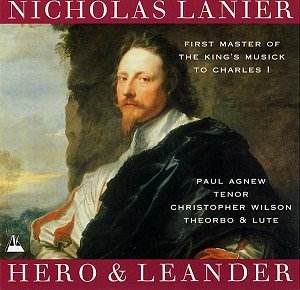|
|
Search MusicWeb Here |
|
 |
||
|
Founder:
Len Mullenger (1942-2025) Editor
in Chief:John Quinn
|
|
|
Search MusicWeb Here |
|
 |
||
|
Founder:
Len Mullenger (1942-2025) Editor
in Chief:John Quinn
|
 |
Nicholas LANIER (1588-1666) |
| CD available for post-free online mail-order or you may download individual tracks. For some labels you can download the entire CD with a single click and make HUGE savings. The price you see is the price you pay! The full booklet notes are available on-line. | |
|
NOTE • Click on the button and you can buy the disc or read the booklet details • You can also access each track which you may then sample or down load. • Further Information. |
|
|
Nicholas Lanier was the first Master of the King’s Musik, a lutenist, singer, painter, art smuggler, friend of Van Dyck and Rubens and creator of a court Masque celebrating the visit to London, in 1617, of Pocahontas. That he was also putatively the lover in Rome of Artemisia seems almost incidental given the catalogue of adventure he experienced. Lanier’s sophistication and Caroline sensibility are powerfully attuned – in both senses – to the relationship between text and music as well as to the domestic and internationalist trends in music making. He frequently accompanied himself on the lute and his judgement in song setting is inevitably unerring if not always incendiary in inspiration. The twelve selections on this beautifully produced disc include Elizabethan lute songs as well as his vigorous Italianate settings and Hero’s complaint to Leander, perhaps his best known piece- a fifteen-minute setting of massively superior imagination. Agnew’s inflective subtlety is used to splendid effect and his experience in this repertoire can constantly be felt whilst Christopher Wilson, writer of the informative sleeve notes, accompanies with great acuity on both lute and theorbo. Colouration and shading in Neither sighs, nor tears is refined and the poem wittily pointed. Agnew’s responsiveness to textual complexity is inevitably accompanied by an excellently equalized softening or hardening of tone and this attentiveness can be seen in Hero’s complaint to Leander <sample 1>. This is a reconstruction amounting to an Italian scena, with an opening and closing symphony by Henry Lawes and a central one by Lanier himself; it thus embodies an amplitude of expression rare in Lanier’s music and is something of a masterpiece of responsiveness. Listen to Agnew’s clarion trumpet tone thrillingly declaim "Heav’ns lend your aid and arm yourselves in thunder." In Amorosa pargoletta the tenor is appositely Italianate, rolling his "r" with tremendous and delighted vigour. In the following Italian setting, Qual musico gentil, we can hear Agnew’s leaps and melismas in the explicitly contemporary Italian style <sample 2>. Lanier was a fluent Italian speaker and spent some time there absorbing its cultural diversity. The two Thomas Carew settings are amongst Lanier’s finest. The Court wit Carew was a follower of Donne and managed to assume at least something of the older poet’s manner; Agnew’s inflective understanding mines, in text and setting, mood and pacing, variously the unambiguously sexual imagery of Mark how the blushful morn or the greater setting No more shall meads be deck’d with flowers. Over a ground bass of proto-Purcellian genius, throughout its seven-minute span, Lanier unfolds a narrative of compelling accomplishment <sample 3>. It more than deserves a place in a conspectus of the great art songs in English. In every way this is a most distinguished recording.
|
|
Return to Index |